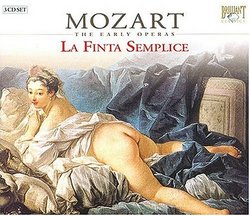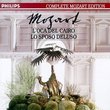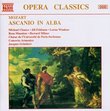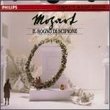| All Artists: Wolfgang Amadeus Mozart, Leopold Hager, Salzburg Mozarteum Orchestra, Antony Rolfe-Johnson, Helen Donath, Jutta-Renate Ihloff, Robert Holl, Robert Lloyd, Teresa Berganza, Thomas Moser Title: Mozart: La Finta Semplice Members Wishing: 0 Total Copies: 0 Label: Brilliant Classics Release Date: 10/26/2004 Genre: Classical Styles: Opera & Classical Vocal, Historical Periods, Classical (c.1770-1830) Number of Discs: 3 SwapaCD Credits: 3 UPC: 842977023459 |
Search - Wolfgang Amadeus Mozart, Leopold Hager, Salzburg Mozarteum Orchestra :: Mozart: La Finta Semplice
 | Wolfgang Amadeus Mozart, Leopold Hager, Salzburg Mozarteum Orchestra Mozart: La Finta Semplice Genre: Classical
|
Larger Image |
CD DetailsSimilar CDs |
CD ReviewsAn extraordinary discovery Roo.Bookaroo | 06/22/2009 (5 out of 5 stars) "This is an astonishing discovery. The sparkling, sunny music of a young boy who is also a completely professional composer and who produces an opera that is enchanting and amusing.
It is absurd to always keep complaining about the young Mozart that he is not up to the level of the so-called "mature" operas. In fact, if you care to listen attentively, you discover that already at 12, Mozart's style is already shaped and recognizable. It's not the "early" operas that offer echoes of the late operas, but the complete reverse: it's the "mature" operas, better labeled "late" operas, which develop and amplify the style and mannerisms, the curlicues, the obsessive passion for orchestral sound effects, the general use of winds, and the power of the young Mozart. The late operas are in fact echoes of the early works. Mozart's music grew up organically, and there's no break between the "young" Mozart and the "adult" Mozart, even though things changed when he arrived in Vienna in 1781, as they had changed before. "The child is father of the man," reminded us William Wordsworth in his famous 1802 poem (" My heart leaps up when I behold/A rainbow in the sky",) not especially thinking about Mozart, although this continuity applies so well to Mozart's organic musical growth. In LA FINTA SEMPLICE, written in 1768, when Mozart was in Vienna, with Leopold networking as hard as he could to get his son recognized and promoted as an opera composer, we already get a full-fledged, full-scale, opera with brilliant Mozart music. In fact we are lucky, since most opera composers have produced their music with the feelings and psychology of grown-ups, and even old men, whereas with Mozart, we have access to the charming budding feelings of a young boy, something truly unique in the annals of music. The box cover is rather amusing, but has little relevance with the love stories of the libretto. Why the producers chose a lascivious Boucher picture, except for its marketing shock value, remains a bit of a mystery. It might have been perhaps more appropriate if the Mozarts had been in Paris at the time. As such, it's a bit incongruous. Since the music is unfailingly beautiful and enticing, the appeal of the recording hinges on the quality of the singing. In one word, it is ravishing, gorgeous. All the singers deliver high-quality performances. Here we have a real balance between male and female voices: four male singers (two tenors and two basses, who add a lot of weight to the feel of the performance) and three top female singers, each one with a voice as adorable as the others. Leopold Hager is always careful in his original productions of Mozart's early operas to use only the very best singers available in the opera community, as a caring parent anxious to give his children the best chance to impress when getting out in the world. Here Helen Donath is Rosina, the "prima donna", supported by Teresa Berganza, a superb mezzo, as Giacinta, and Juta-Renate Ihloff, as the adorable soubrette Ninetta. The men are also top-drawer: The great bass Robert Holl in the key character of Don Cassandro; with Thomas Moser, always an excellent tenor in Mozart, as Fracasso, the dashing captain; Anthony Rolfe-Johnson as the timid and weak-in-the-head Don Polidoro; and the superb Robert Lloyd as the second bass, Simone. Again the cast is unbeatable and insurpassable. Bravo Hager for putting together such a fantastic cast. La Finta Semplice then can show off all its scintillating facets. Leopold Hager is sure to get a huge warm hug from Mozart when he gets to meeting him on his cloud, where he's become the music director for God's orchestra and his choir of angels, who now sing only Mozart's music! What's surprising is that this Leopold Hager production is not included in the famous Philips box of Mozart's "Early Italian Operas", in the COMPLETE COMPACT MOZART EDITION of 2000 and 2006, which includes five operas, all directed by Leopold Hager, except for this very one. The Philips box includes a version of LA FINTA SEMPLICE directed by Peter Schreier. That box does not include any libretto, only a list of recitatives and arias, whereas this Hager version offers a libretto, if only in Italian, no translations, but that's better than nothing. Note that the box set of the "Early Italian Operas" (13 CDs) is incorporated in the new release by Decca of MOZART: THE COMPLETE OPERAS, of August 2009 (44 CDs). The Schreier version is shorter than this one, 146" 55" against 165' 54" for the Hager one, which is probably complete, since Hager is always intransigent about producing reference recordings. However, both versions are excellent. The price of this Brilliant recording is very reasonable, and one can afford buying it separately from the complete box of Philips "Early Italian operas" or the Decca "MOZART: THE COMPLETE OPERAS. I have both, and am thus the happy owner of two versions of LA FINTA SEMPLICE. And I have listened to both many, many times. One cannot tire of them. Could one be a more addicted lover of Mozart' s music? What is not enough emphasized is that this opera by a 12-year old is mind-boggling. It is beyond comprehension that a young boy would have the polished technical skills and the full-range sensibility to put so many emotions and feelings in music. It's a sheer miracle. And LA FINTA SEMPLICE does explain why the same boy was able to grow and write later the stunning marvels of the 1780's. All the "seeds" of the future Mozart are already in LA FINTA SEMPLICE. Music writers who complacently write this early opera off as negligible and a simple curiosity are making a fundamental mistake. They misrepresent Mozart's evolution:he did not develop in disjointed phases, "early", "middle", "mature", but in a continuous, organic stream of music and expressiveness. The last phase, of the 1786-1791 period, may not even have been the so-called "mature" one, which was possibly in the making, and not yet in its final form and shape, one that we, inconsolably, will never know. After so many listens, I remain dumbfounded by the brilliance and the professionalism of this music. This opera is more of a miracle than anything else composed by Mozart. It made possible all the marvelous music that was to come later. It is only an eternal regret that we never had the late-age and even old-age music of this phenomenon. But at least we have the sparkling opera music of youth, something that is not available from any other composer, and LA FINTA SEMPLICE is the best illustration of its extraordinary beauty and irresistible charm. ROO.BOOKAROO" |

 Track Listings (23) - Disc #1
Track Listings (23) - Disc #1![Mendelssohn: Complete Choral Works [Box Set]](https://nationalbookswap.com/cd//m/22/7722/6137722.jpg)


